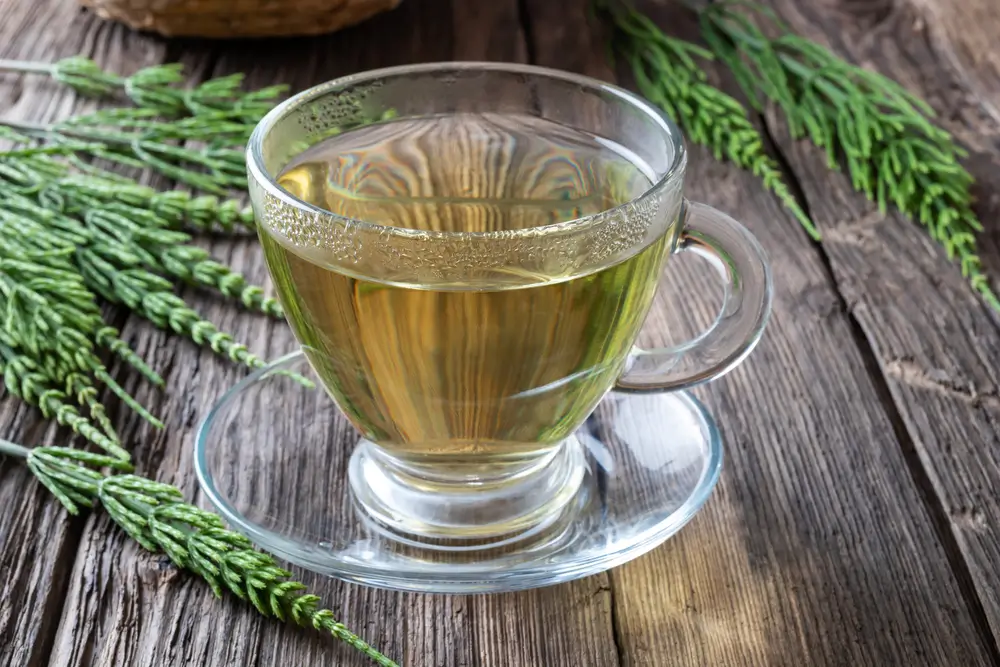Horsetail tea, derived from the horsetail plant (Equisetum arvense), is an ancient herbal remedy that has been used for centuries in traditional medicine. Known for its high silica content and unique nutritional profile, horsetail tea offers a wide range of health benefits, from supporting bone health to promoting skin and hair vitality. This humble plant, often considered a weed, has earned its place as a powerful natural remedy.
In this blog post, we’ll explore the benefits and uses of horsetail tea and why it might be worth adding to your wellness routine.
What Is Horsetail?
Horsetail is a perennial plant that grows in moist, sandy soils across Europe, Asia, and North America. It’s one of the oldest plants on Earth, with a history dating back to prehistoric times. The plant gets its name from its resemblance to a horse’s tail, with thin, segmented stems that grow vertically. Horsetail is rich in silica, antioxidants, and other bioactive compounds, making it a popular ingredient in herbal teas, supplements, and skincare products.
Nutritional Profile of Horsetail Tea
Horsetail tea is packed with nutrients and bioactive compounds, including:
- Silica: Essential for collagen production, bone health, and skin elasticity.
- Antioxidants: Including flavonoids and phenolic acids, which protect cells from oxidative damage.
- Minerals: Such as calcium, magnesium, potassium, and iron.
- Saponins: Compounds with anti-inflammatory and antimicrobial properties.
Health Benefits of Horsetail Tea
- Supports Bone Health
Horsetail is one of the richest natural sources of silica, a mineral essential for maintaining strong bones and connective tissues. Regular consumption of horsetail tea may help prevent osteoporosis and improve bone density. - Promotes Skin, Hair, and Nail Health
The silica in horsetail tea supports collagen production, which is vital for healthy skin, hair, and nails. It may help reduce wrinkles, strengthen brittle nails, and promote hair growth. - Rich in Antioxidants
Horsetail tea contains antioxidants that neutralize free radicals, reducing oxidative stress and lowering the risk of chronic diseases like heart disease and cancer. - Supports Kidney and Urinary Health
Horsetail has diuretic properties, meaning it helps increase urine production and flush out toxins from the body. This makes it beneficial for supporting kidney function and preventing urinary tract infections (UTIs). - May Aid in Wound Healing
The anti-inflammatory and antimicrobial properties of horsetail tea may help speed up wound healing and reduce the risk of infection. - Reduces Inflammation
Horsetail tea has been used traditionally to alleviate inflammation in conditions like arthritis and gout. Its anti-inflammatory compounds may help reduce pain and swelling. - Supports Respiratory Health
Horsetail tea has been used to relieve respiratory issues like coughs, bronchitis, and asthma due to its anti-inflammatory and antimicrobial properties. - May Improve Blood Sugar Control
Some studies suggest that horsetail tea may help regulate blood sugar levels, making it a potential aid for individuals with diabetes. - Promotes Digestive Health
Horsetail tea has been used to soothe digestive issues like bloating, gas, and stomach cramps. Its mild diuretic properties may also help reduce water retention. - Supports Cardiovascular Health
The antioxidants and minerals in horsetail tea may help lower blood pressure, reduce cholesterol levels, and improve overall heart health.
How to Make Horsetail Tea
Horsetail tea is easy to prepare and can be enjoyed hot or cold. Here’s a simple recipe:
Ingredients:
- 1-2 teaspoons of dried horsetail herb
- 1 cup of hot water
- Honey or lemon (optional, for flavor)
Instructions:
- Place the dried horsetail herb in a tea infuser or teapot.
- Pour hot water over the herb and let it steep for 5-10 minutes.
- Strain the tea and add honey or lemon if desired.
- Enjoy!
Potential Side Effects and Precautions
While horsetail tea offers many benefits, there are a few considerations to keep in mind:
- Thiamine Depletion: Horsetail contains an enzyme called thiaminase, which can break down thiamine (vitamin B1). Prolonged use may lead to thiamine deficiency. To avoid this, limit consumption to short periods or opt for horsetail products with the thiaminase enzyme removed.
- Allergic Reactions: Some individuals may be allergic to horsetail or plants in the same family.
- Pregnancy and Breastfeeding: Horsetail tea is not recommended for pregnant or breastfeeding women due to potential risks.
- Medication Interactions: Horsetail may interact with certain medications, including diuretics, lithium, and blood thinners. Consult your doctor before using horsetail tea if you’re on medication.
- Heavy Metal Contamination: Horsetail plants can absorb heavy metals from the soil. Always source horsetail from reputable suppliers to ensure safety.

Horsetail tea is a time-tested herbal remedy with a wide range of health benefits, from supporting bone and skin health to promoting kidney function and reducing inflammation. Its rich silica content and antioxidant properties make it a valuable addition to your wellness routine. However, it’s important to use horsetail tea responsibly and be aware of potential side effects and contraindications.
So, the next time you’re looking for a natural way to boost your health, consider brewing a cup of horsetail tea – your body might just thank you for this ancient remedy!
Have you tried horsetail tea?
Share your experiences and favorite ways to use it in the comments below! 🌿

